Mercedes EQV vs Kia PV5 - Differences and prices compared
Compare performance (204 HP vs 163 HP), boot space and price (50700 £ vs 32800 £) at a glance. Find out which car is the better choice for you – Mercedes EQV or Kia PV5?
Costs and Efficiency:
Looking at overall running costs, both models reveal some interesting differences in everyday economy.
Kia PV5 has a convincingly advantage in terms of price – it starts at 32800 £, while the Mercedes EQV costs 50700 £. That’s a price difference of around 17927 £.
In terms of energy consumption, the advantage goes to the Kia PV5: with 19 kWh per 100 km, it’s clearly more efficient than the Mercedes EQV with 27.10 kWh. That’s a difference of about 8.10 kWh.
As for range, the Kia PV5 performs a bit better – achieving up to 416 km, about 52 km more than the Mercedes EQV.
Engine and Performance:
Power, torque and acceleration are the classic benchmarks for car enthusiasts – and here, some clear differences start to show.
When it comes to engine power, the Mercedes EQV has a evident edge – offering 204 HP compared to 163 HP. That’s roughly 41 HP more horsepower.
In acceleration from 0 to 100 km/h, the Mercedes EQV is hardly perceptible quicker – completing the sprint in 10.30 s, while the Kia PV5 takes 10.60 s. That’s about 0.30 s faster.
There’s also a difference in torque: Mercedes EQV pulls evident stronger with 365 Nm compared to 250 Nm. That’s about 115 Nm difference.
Space and Everyday Use:
Cabin size, boot volume and payload all play a role in everyday practicality. Here, comfort and flexibility make the difference.
Seats: Mercedes EQV offers to a small extent more seating capacity – 6 vs 5.
In curb weight, Kia PV5 is decisively lighter – 1860 kg compared to 2666 kg. The difference is around 806 kg.
In terms of boot space, the Mercedes EQV offers slight more room – 1410 L compared to 1330 L. That’s a difference of about 80 L.
When it comes to payload, Mercedes EQV hardly perceptible takes the win – 834 kg compared to 790 kg. That’s a difference of about 44 kg.
Who wins the race?
The Kia PV5 proves to be leads convincingly overall and therefore becomes our DriveDuel Champion!
Kia PV5 is the better all-rounder in this comparison.
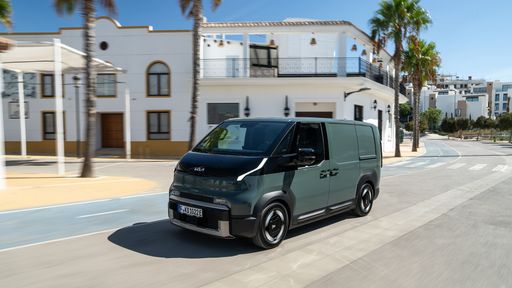
Kia PV5
Costs and Consumption
View detailed analysis
Engine and Performance
View detailed analysis
Dimensions and Body
View detailed analysis
Mercedes EQV
The Mercedes EQV is a serene electric people‑mover that wraps practical interior space in true Mercedes luxury, turning long trips into a first‑class commute. It’s perfect for families and executives who want silent, comfortable transport with a premium feel, and it manages to be both sensible and a little bit smug in the best possible way.
details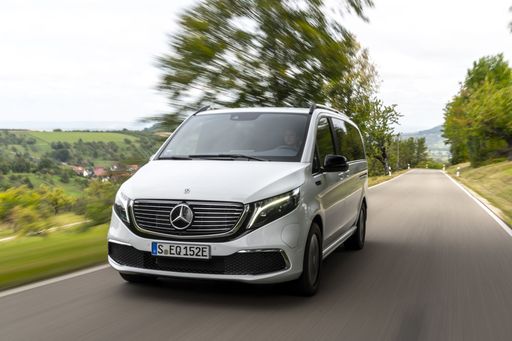
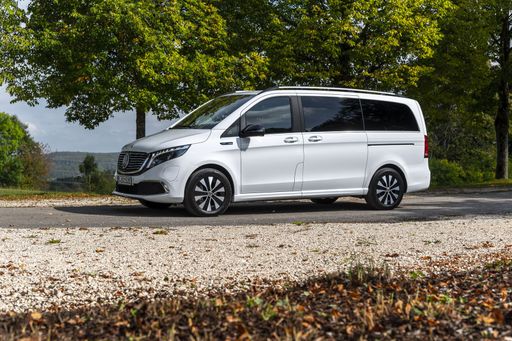
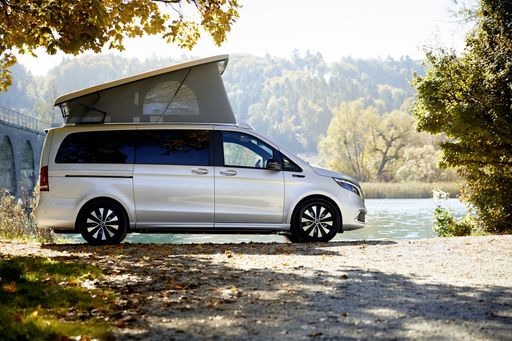
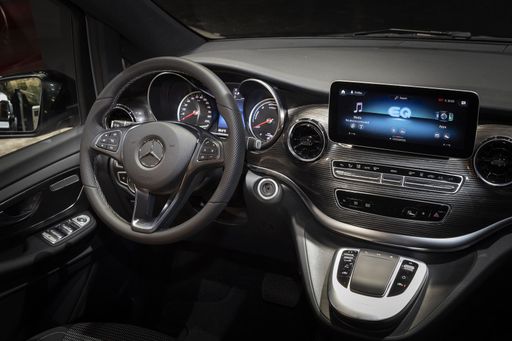
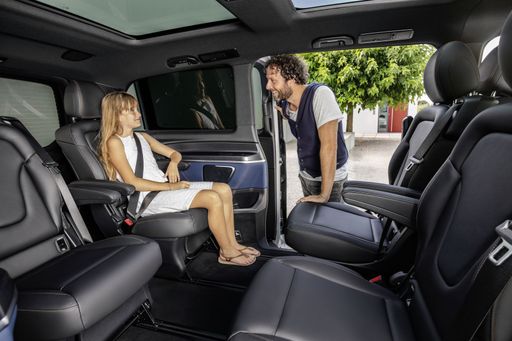
Kia PV5
The Kia EV5 is an exciting new entrant in the landscape of electric SUVs, promising a blend of style and innovation that captures attention. It boasts a sleek and modern design that aligns with Kia's evolving aesthetic identity, blending practicality with eye-catching details. With its foray into the electric vehicle segment, the EV5 is set to offer a highly competitive option for those looking to embrace sustainable mobility without compromising on comfort or tech features.
details




|

|
|
|
|
Costs and Consumption |
|
|---|---|
|
Price
50700 - 54400 £
|
Price
32800 - 38900 £
|
|
Consumption L/100km
-
|
Consumption L/100km
-
|
|
Consumption kWh/100km
27.1 - 27.5 kWh
|
Consumption kWh/100km
19 - 19.3 kWh
|
|
Electric Range
244 - 364 km
|
Electric Range
295 - 416 km
|
|
Battery Capacity
60 - 90 kWh
|
Battery Capacity
-
|
|
co2
0 g/km
|
co2
0 g/km
|
|
Fuel tank capacity
-
|
Fuel tank capacity
-
|
Dimensions and Body |
|
|---|---|
|
Body Type
Bus
|
Body Type
Cargo Van, Bus
|
|
Seats
6
|
Seats
2 - 5
|
|
Doors
5
|
Doors
-
|
|
Curb weight
2666 - 2863 kg
|
Curb weight
1860 - 2145 kg
|
|
Trunk capacity
1030 - 1410 L
|
Trunk capacity
1330 L
|
|
Length
5140 - 5370 mm
|
Length
-
|
|
Width
1928 mm
|
Width
1895 mm
|
|
Height
1920 - 1923 mm
|
Height
-
|
|
Max trunk capacity
4630 - 5010 L
|
Max trunk capacity
-
|
|
Payload
637 - 834 kg
|
Payload
455 - 790 kg
|
Engine and Performance |
|
|---|---|
|
Engine Type
Electric
|
Engine Type
Electric
|
|
Transmission
Automatic
|
Transmission
Automatic
|
|
Transmission Detail
Reduction Gearbox
|
Transmission Detail
Reduction Gearbox
|
|
Drive Type
Front-Wheel Drive
|
Drive Type
Front-Wheel Drive
|
|
Power HP
204 HP
|
Power HP
121 - 163 HP
|
|
Acceleration 0-100km/h
10.3 - 12.1 s
|
Acceleration 0-100km/h
10.6 - 16.2 s
|
|
Max Speed
140 km/h
|
Max Speed
-
|
|
Torque
365 Nm
|
Torque
250 Nm
|
|
Number of Cylinders
-
|
Number of Cylinders
-
|
|
Power kW
150 kW
|
Power kW
89 - 120 kW
|
|
Engine capacity
-
|
Engine capacity
-
|
General |
|
|---|---|
|
Model Year
2024
|
Model Year
2025
|
|
CO2 Efficiency Class
A
|
CO2 Efficiency Class
A
|
|
Brand
Mercedes-Benz
|
Brand
Kia
|
What drive types are available for the Mercedes EQV?
The Mercedes EQV is available as Front-Wheel Drive.
The prices and data displayed are estimates based on German list prices and may vary by country. This information is not legally binding.
